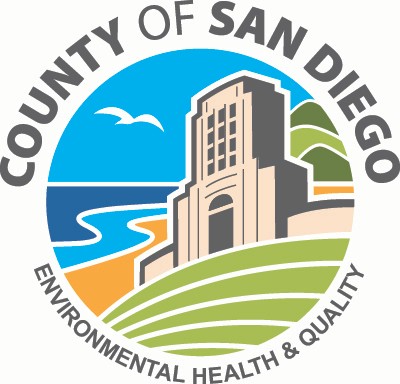What Is New In Food?
| Temporary Food Facility Program Outreach |
View this presentation
from our outreach on October 2, 2025 to learn permitting and
operational requirements for our Temporary Food Facility Program, as
well as our new online application submittal process.
For
more information regarding Temporary Food Facility, please visit
our Temporary
Food Events website.
| Compliance Advisory on Behalf of Air Pollution Control District |
New Rule 67.26 – Commercial Charbroiling Operations
On
August 14, 2025, the San Diego County Air Pollution Control District
(APCD) Governing Board adopted Rule 67.26 for commercial charbroiling
operations (https://shorturl.at/Z0XX1).
The rule is estimated to reduce 14 tons of Particulate Matter, smaller
than 2.5 microns (PM2.5) and 4.5 tons of Volatile Organic Compounds
(VOCs) each year. Both are air pollutants which contribute to a wide
range of diseases impacting the heart, lungs and brain, and can cause
other adverse health effects.
Rule 67.26 is now effective
and applies to owners/operators of chain-driven charbroilers operated
at commercial food establishments throughout San Diego County. A
Compliance Advisory is available with additional information (Rule
67.26-Compliance Advisory), including a list of APCD contacts
for questions or assistance.
| Sports-Harvested Shellfish Warning |
Updated 06/06/2025: CDPH has lifted the shellfish advisory for sport-harvested clams, scallops, and oysters from San Diego County. CDPH Lifts Warnings about Sport-Harvested Bivalve Shellfish from San Diego County.
Please Note: The Annual Mussel Quarantine, prohibiting recreational harvest of mussels for human consumption, is still in effect.
For any questions, call the Shellfish Biotoxin Information Line (800) 553-4133, or visit the California Department of Public Health website regarding Shellfish Advisories or the County’s One Health Epidemiology website.
| Food Facility Outreach - Vermin |
Watch this video of our recent virtual meeting to learn important tips and best practices for keeping your restaurant clean, safe, and vermin free. The video includes information on applicable code sections related to vermin control within a food facility; how to identify types of vermin and the public health risks associated with them; proper corrective actions, steps, and treatment measures; and steps needed to reopen following a vermin closure.
To view this video in your preferred language, press settings, then subtitles, then auto-translate and pick your language when captions are made available by YouTube.
Arabic
.لمشاهدة هذا الفيديو بلغتك المفضلة، اضغط على الإعدادات، ثم الترجمة، ثم الترجمة التلقائية واختر لغتك
Chinese
要以您喜歡的語言觀看此視頻,請按設置,然後按字幕,然後自動翻譯並選擇您的語言。
Filipino
Upang mapanood ang video na ito sa gusto mong wika, pindutin ang mga setting, pagkatapos ay mga subtitle, pagkatapos ay awtomatikong isalin at piliin ang iyong wika.
Korean
원하는 언어로 이 비디오를 보려면 설정을 누르고 자막을 누른 다음 자동 번역하고 언어를 선택하세요.
Persian
.برای مشاهده این ویدیو به زبان دلخواه خود، تنظیمات، سپس زیرنویس ها را فشار دهید، سپس ترجمه خودکار را فشار دهید و زبان خود را انتخاب کنید
Somali
Si aad u daawato muqaalkan luuqada aad door bidayso, taabo settings ka dibna qoraal hoosaadyo, dabadeed si toos ah u tarjun oo dooro luqadaada.
Spanish
Para ver este video en su idioma preferido, presione configuración, luego subtítulos, luego traduzca automáticamente y elija su idioma.
Vietnamese
Để xem video này bằng ngôn ngữ bạn ưa thích, hãy nhấn cài đặt, sau đó nhấn phụ đề, sau đó dịch tự động và chọn ngôn ngữ của bạn.
| Keeping Your Restaurant Vermin-Free |
Watch this video for a look at how to properly maintain a vermin-free restaurant, which includes tips on preventing vermin infestation, conducting routine self-inspections for vermin in the food facility, and taking proper and immediate action to eliminate any vermin issue to protect your customer’s health.
To view this video in your preferred language, press settings, then subtitles, then auto-translate and pick your language when captions are made available by YouTube.
Arabic
.لمشاهدة هذا الفيديو بلغتك المفضلة، اضغط على الإعدادات، ثم الترجمة، ثم الترجمة التلقائية واختر لغتك
Chinese
要以您喜歡的語言觀看此視頻,請按設置,然後按字幕,然後自動翻譯並選擇您的語言。
Filipino
Upang mapanood ang video na ito sa gusto mong wika, pindutin ang mga setting, pagkatapos ay mga subtitle, pagkatapos ay awtomatikong isalin at piliin ang iyong wika.
Korean
원하는 언어로 이 비디오를 보려면 설정을 누르고 자막을 누른 다음 자동 번역하고 언어를 선택하세요.
Persian
.برای مشاهده این ویدیو به زبان دلخواه خود، تنظیمات، سپس زیرنویس ها را فشار دهید، سپس ترجمه خودکار را فشار دهید و زبان خود را انتخاب کنید
Somali
Si aad u daawato muqaalkan luuqada aad door bidayso, taabo settings ka dibna qoraal hoosaadyo, dabadeed si toos ah u tarjun oo dooro luqadaada.
Spanish
Para ver este video en su idioma preferido, presione configuración, luego subtítulos, luego traduzca automáticamente y elija su idioma.
Vietnamese
Để xem video này bằng ngôn ngữ bạn ưa thích, hãy nhấn cài đặt, sau đó nhấn phụ đề, sau đó dịch tự động và chọn ngôn ngữ của bạn.




